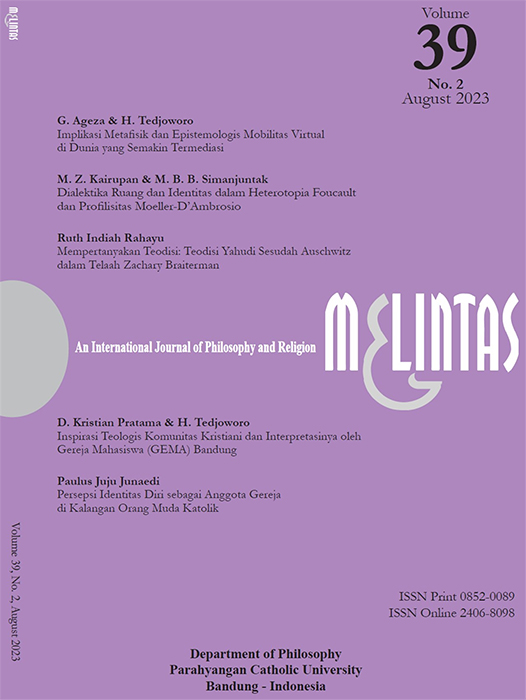Implikasi Metafisik dan Epistemologis Mobilitas Virtual di Dunia yang Semakin Termediasi
DOI:
https://doi.org/10.26593/mel.v39i2.7778Keywords:
presence, screen, pandemic, holistic reality, epistemology, perspectives, mediated worldAbstract
Humans created screen in the rapid development of technology, and its existence has fundamentally influenced people’s daily lives. One of the things most affected is human understanding of space and time. This article elaborates Anne Friedberg’s ideas in correlation with the views of other thinkers, especially regarding the metaphysical and epistemological impacts of screen to humans’ relation to reality since the pandemic. The metaphysical aspect of the screen concerns the materiality and immateriality of the screen, as well as how the concept of presence is understood in this context. Meanwhile, the epistemological aspect of the screen focuses on issues of perception and how humans understand the world. The metaphysical and epistemological implications of virtual mobility in a world increasingly mediated by 'screens' give rise to several different perspectives that can question the Carthusian and dualistic conceptual framework of reality. Just as plurality is a fact, the mediated world is also a fact. Correcting the metaphysical ‘tradition’ that has been recognised as the most determining rationality will not be an easy effort. In the discourse of science and certainty regarding the existence of reality, perhaps it is not the literal or symbolic screen that must be reinterpreted, but the human perspective itself. A person's point of view cannot be judged as wrong or right, apart from being recognised and respected as an element that forms the very rich reality. Recognising a multi-perspective reality will perhaps mark a return to amazement in the realms of science, philosophy, and life.
Downloads
Published
Issue
Section
License
Copyright (c) 2024 Gorivana Ageza, Hadrianus Tedjoworo

This work is licensed under a Creative Commons Attribution-NonCommercial 4.0 International License.
MELINTAS applies the Creative Commons Attribution (CC BY NC) license to articles and other works we publish. If you submit your paper for publication by MELINTAS, you agree to have the CC BY NC license applied to your work.


